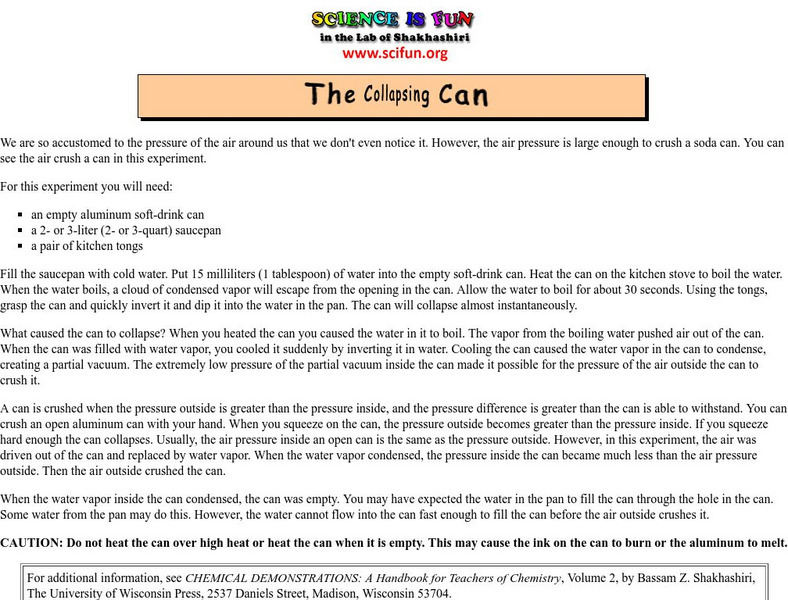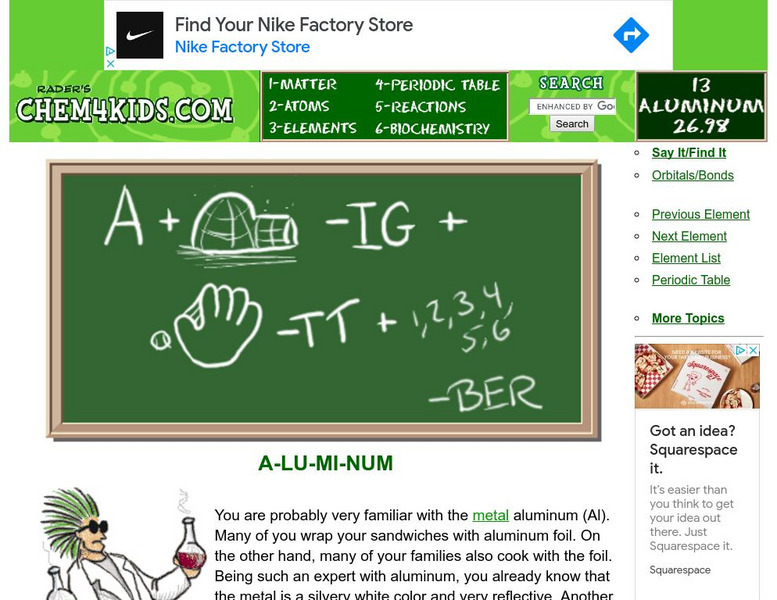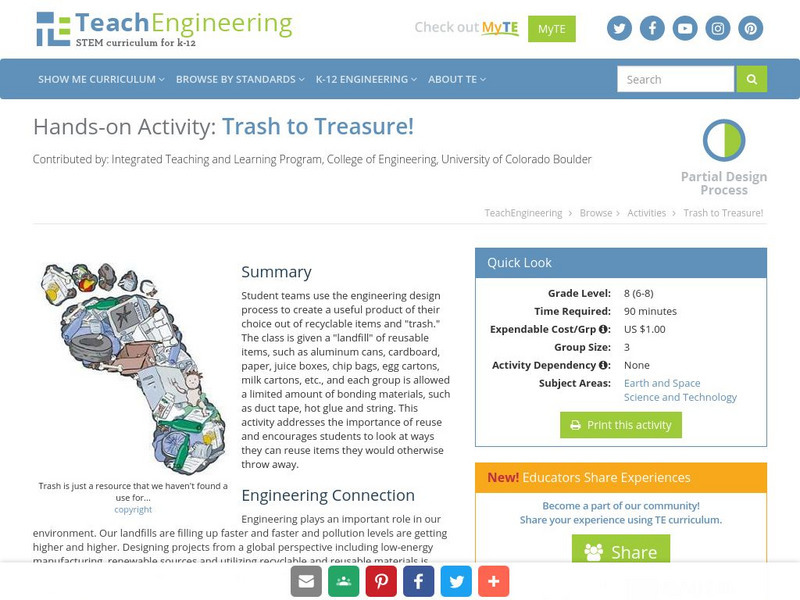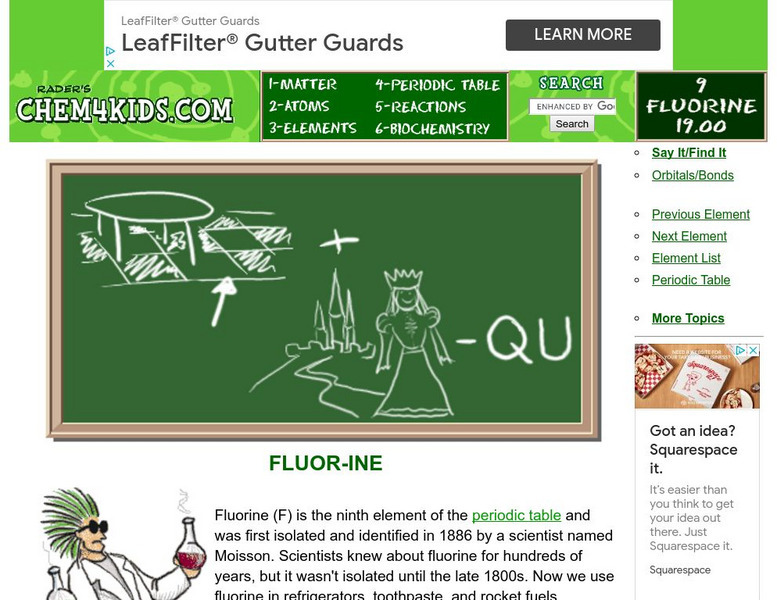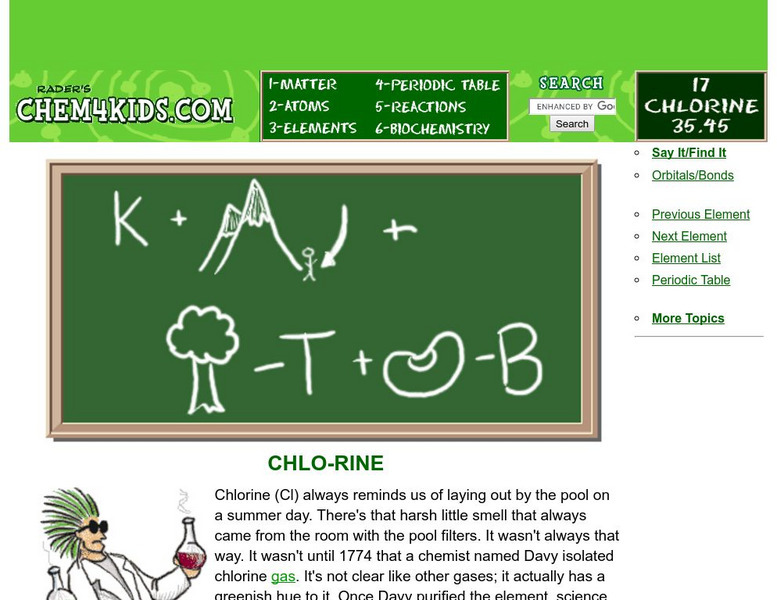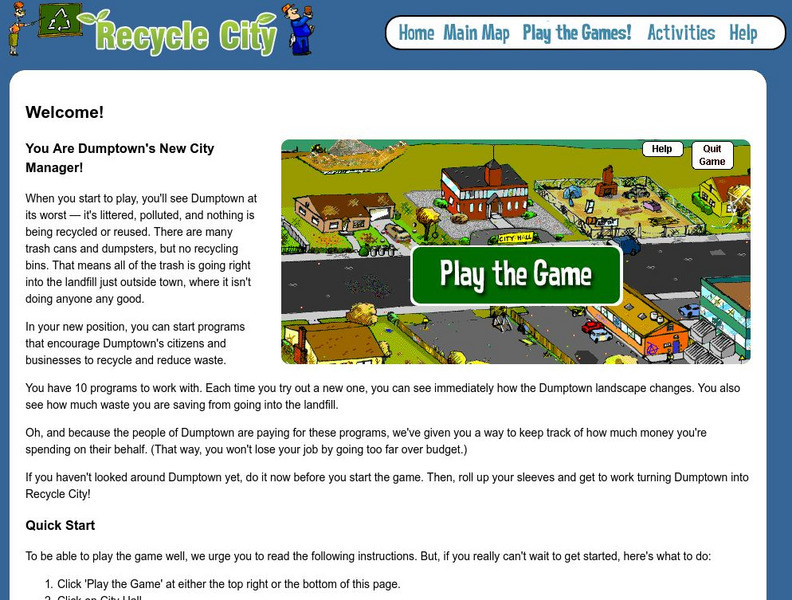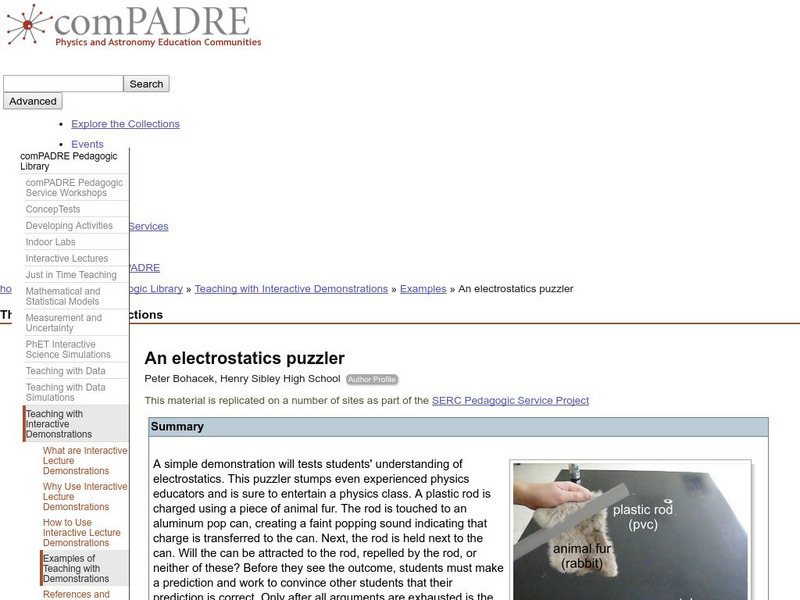Other
The Aluminum Association, Inc.
A great site about aluminum with facts about the industry, recycling and much more. Get current events info here.
Physics Classroom
The Physics Classroom: Static Electricity: Aluminum Can Polarization Interactive
Visualize the underlying cause for the attraction between a charged and an uncharged object. The animation allows students to see the response of electrons.
Other
Web ref.org: Aluminum
Here you can find a detailed overview of aluminum. Content includes a focus on aluminum's chemical properties, occurrence in nature, uses, and production.
Science Buddies
Science Buddies: Baseball Bat Debate: What's Better, Wood or Aluminum?
Science and math abound in baseball. In this project, you can produce some interesting baseball statistics of your own and perhaps settle a long-standing debate. You'll set up experiments at your local playing field to find out which...
Alabama Learning Exchange
Alex: Picture a Perfect Environment
In this lesson plan from "The Friends of Auntie Litter", (www.auntielitter.org), recycling aluminum cans will be explored. Learners will also create a set of stilts made from cans. This lesson plan is one from the "Take Pride Statewide"...
Science is Fun
Fun Science: The Collapsing Can
Air pressure can be dramatically shown with this simple experiment that only requires an aluminum can, tongs, a 2-3 quart sauce pan and a stove.
Science is Fun
Science Is Fun: The Collapsing Can
An experiment using an aluminum can and boiling water that demonstrates that the air around us has pressure, although we may not be aware of it.
Illustrative Mathematics
Illustrative Mathematics: G Mg How Thick Is a Soda Can? Variation Ii
In this task, students are given an aluminum soda can and are simply asked how they could determine how thick the can is. Aligns with G-MG.A.1 and G-MG.A.2.
Illustrative Mathematics
Illustrative Mathematics: G Mg How Thick Is a Soda Can? Variation I
In this task, students are given the dimensions of a soda can and are asked to estimate its thickness. They must first find the surface area and the volume of aluminum. Aligns with G-MG.A.1 and G-MG.A.2.
Chem4kids
Chem4 Kids: Aluminum (Al)
Here you can find some great information about the 13th element in the periodic table, "aluminum." Content focuses on aluminum's electrons, where you can find aluminum in nature and in the home, and how aluminum combines with other...
TeachEngineering
Teach Engineering: Trash to Treasure!
Student teams use the engineering design process to create a useful product of their choice out of recyclable items and "trash." The class is given a "landfill" of reusable items, such as aluminum cans, cardboard, paper, juice boxes,...
TeachEngineering
Teach Engineering: I Can't Take the Pressure!
Students develop an understanding of air pressure by using candy or cookie wafers to model how it changes with altitude, by comparing its magnitude to gravitational force per unit area, and by observing its magnitude with an aluminum can...
Chem4kids
Chem4 Kids: Fluorine
Here you can find some great information about the 9th element in the periodic table, "fluorine." Content focuses on fluorine's electrons, where you can find fluorine in nature and in the home, and how fluorine combines with other elements.
Chem4kids
Chem4 Kids: Phosphorus (P)
Here you can find some great information about the 15th element in the periodic table, "phosphorus." Content focuses on phosphorus' electrons, where you can find phosphorus in nature and in the home, and how phosphorus combines with...
Chem4kids
Chem4 Kids: Chlorine (Cl)
The 17th element in the periodic table is defined, chlorine. Find out how many electrons chlorine has and where you can find it in nature and in the home.
US Environmental Protection Agency
Epa: Dumptown Game
This fun game helps students learn ways to recycle, reduce waste, and compost. You can also create your own Recycle City Scavenger Hunt.
Science Education Resource Center at Carleton College
Serc: Observing the Effect of Temperature on Change of State and Gas Pressure
This lab serves as a short introduction to both changes in state and air pressure/the gas laws. The students will heat a small amount of water in an aluminum can. They will then invert it in a bucket of cold water and crush the can using...
Other
Recycle Runway
With a stress on saving and protecting the environment, these clothes are handmade from materials such as aluminum cans and glass.
Geographic
Photius: Tajikistan: Economy Index
Here you can find out about the current economic status of Tajikistan (as of 2007) from the CIA World Factbook. Click on the topics to gather the information.
Science Education Resource Center at Carleton College
Serc: An Electrostatics Puzzler
A simple demonstration will tests students' understanding of electrostatics. This puzzler stumps even experienced physics educators and is sure to entertain a physics class. A plastic rod is charged using a piece of animal fur. The rod...
Concord Consortium
Concord Consortium: Stem Resources: Evaporative Cooler
Build an air conditioner in this activity using a washcloth, coat hanger, aluminum pan, and three-speed fan. After constructing the air, students will measure the air, water, and wet cloth temperature as well as measuring the humidity....
Texas Instruments
Texas Instruments: Reflectivity of Light
In this activity, students can use a Light Sensor to measure reflection values from paper of various colors and compare these values to reflection values of aluminum foil. They will also calculate percent reflectivity.
US Geological Survey
U.s. Geological Survey: Minerals Information
The USGS offers maps of the locations of mines and mineral processing plants. You can find the sources for everything from aluminum to zircon!
McREL International
Mc Rel: Whelmer #10 Learning Activity: Singing Rod
An easy to do activity that investigates the simple observable properties of sound waves. The activity is presented in lesson plan format that meets NSES standards.






